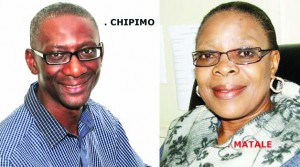 By JOWIT SALUSEKI –
By JOWIT SALUSEKI –
ZAMBIA has been using the First-Past-The-Post (FPTP) or winner takes all systems to elect a Republican president.
The winning candidate in these elections is determined on the basis of a simple majority vote.
Zambia has been using the FPTP) electoral system since 1964.
This plurality system simply awards the presidency to the individual candidate who receives the most votes in an election.
The candidate need not get a majority 50 per cent plus one of the vote to win, so long as he has a larger number of votes than all other candidates, he is declared the winner.
Plurality systems normally depend on single-member constituencies and allow voters to indicate only one vote on their ballot.
In the Western world also, elections for the House and Senate in the United States (US) and for the House of Commons in the United Kingdom (UK) use the plurality system.
The US presidential election is also generally considered a plurality system, but the existence of the Electoral College actually makes it a strange hybrid of plurality and majority systems.
However, in Zambia with President Edgar Lungu assenting to the Constitution Amendment Bill, the 2016 tripartite elections would be held under an amended Constitution with a presidential candidate required to amass 50 per cent plus one vote to be declared a winner.
Majority electoral systems attempt to provide for a greater degree of representativeness by requiring that candidates achieve a majority of votes in order to win.
“Majority” is normally defined as 50 per cent plus one vote.
If no candidate gets a majority of votes, then a second round of voting is held, often a week or two after the initial ballot.
In the second round of voting, only a select number of candidates from the first round are allowed to participate.
In some countries where the 50 per cent plus one has been used, the top two vote-getters in the first round move on to the second round.
The US Electoral College also has components of a majority system; because a presidential candidate must get 50 per cent plus one electoral votes (270 out of 538) in order to win.
If no candidate reaches the 270 mark, the election is decided by the House of Representatives.
The candidate who gets a plurality of the popular vote in a state gets all that state’s electoral votes.
Many stakeholders believe the 50 per cent plus one vote would help minimise presidential petitions which have been a thorny issue in some of the past elections held in Zambia.
Examples of presidential petitions in the country abound with the general elections held on December 27, 2001, which ushered into power late Levy Mwanawasa standing out as one example.
Victory for the then ruling Movement for Multi-party Democracy (MMD) whose candidate Levy Mwanawasa got about 29 per cent of the total vote cast was disputed by the main opposition parties which included the United Party for National Development (UPND) whose candidate Anderson Mazoka garnered about 27 per cent of the total votes cast.
Christian Democratic Party (CDP) President Danny Pule said in view of the amendments to the Constitution which now require a presidential candidate to amass 50 per cent plus one of votes, it was clear that if political parties remained fragmented , no political party would get the required votes.
Dr Pule said less formidable parties should form partnerships with established ones to ensure that Zambia does not go for a presidential re-run.
“This means that there will be a re-run which is an extra cost to Zambians so the smaller parties should form coalitions with two front–runners to avoid that,” Dr Pule said.
He said politicians should make selfless decisions for the benefit of Zambians.
Dr Pule expressed happiness that opposition National Restoration Party leader Elias Chipimo Junior has already made a similar progressive decision by opting not to contest the forthcoming elections.
The onus, Dr Pule said, was on the remaining political party presidents to decide not to contest the elections and instead support one of the bigger political parties that should be identified.
Zambians for Empowerment and Development leader, Fred Mtesa said it is possible for a well organised political party to have its candidate win the election under the new law.
Dr Mtesa said it was, however, too early for his party to state its position on whether it would support a particular candidate or contest elections.
Forum for Democratic Alternatives President Ludwig Sondashi said he will not contest the election but would choose one formidable and relevant party to support.
“It is not good for all political parties to contest the 2016 elections, especially after the adoption of the 50-per cent plus one vote clause,” Dr Sondashi said.
People’s Party (PP) president Mike Mulongoti said all political parties need to work together ahead of next year’s elections.
He said his party will choose a preferred presidential candidate and political party it will support in the 2016 polls.
Council of Churches in Zambia (CCZ) General Secretary Reverend Suzanne Matale said going by the country’s past experience where presidential petitions have been the order of the day, it has proved that the 50 per cent plus one threshold is the best way of choosing a Government.
Rev Matale said the 50 per cent plus one vote was good for the country as the simple majority had led to the country ushering into power minority governments.
Other African countries which require a presidential candidate to amass 50 per cent plus one to be voted to the presidency include Malawi, Nigeria, Central African Republic (CAR), Ethiopia, Senegal, Ghana and Ivory Coast to mention but few.






